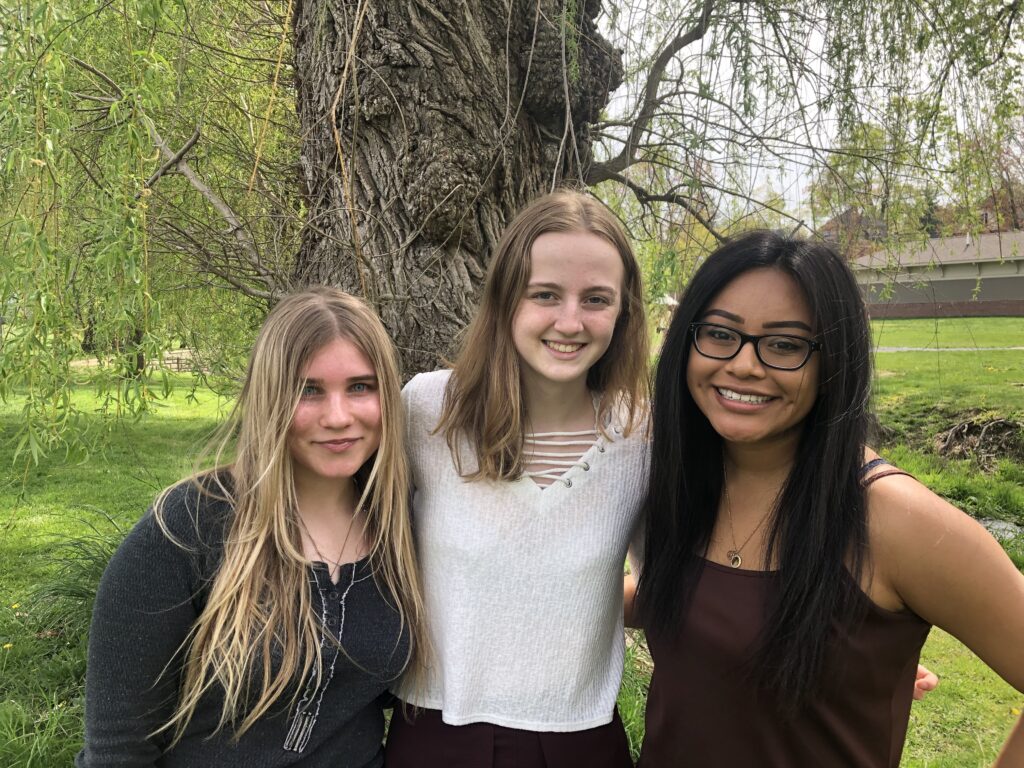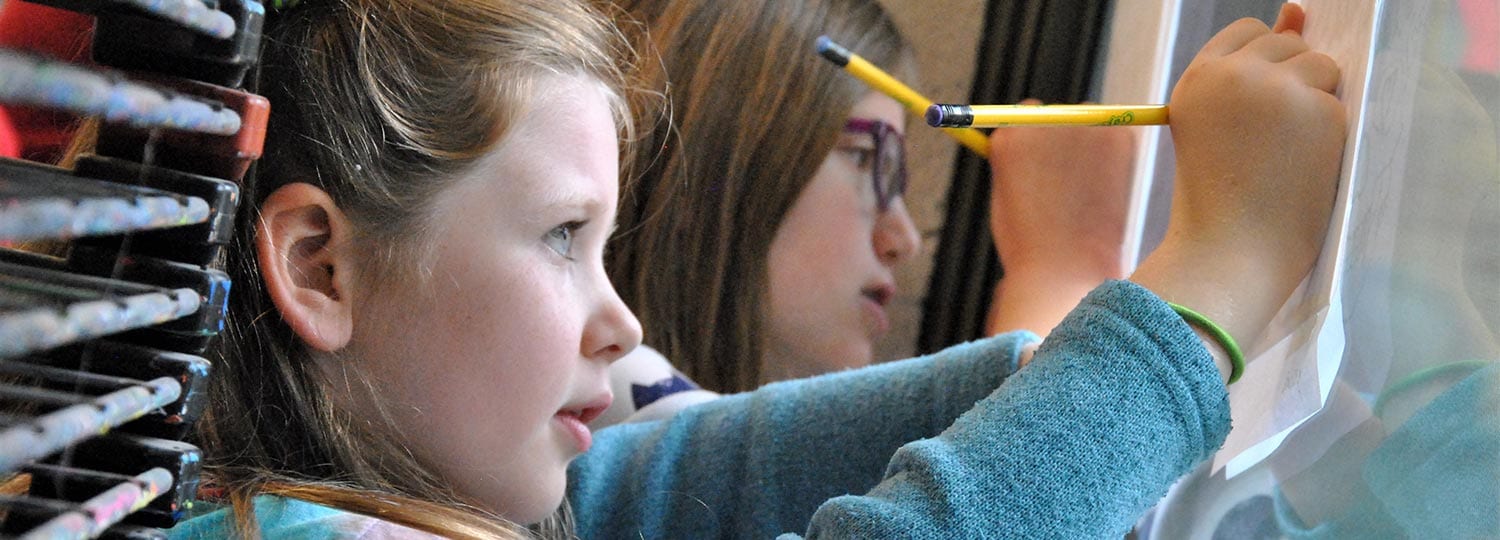WVHS Science Research Program: amazing real-world experience + college credits
Warwick Valley High School’s Science Research Program is a three-year program that gives students the invaluable opportunity to participate in the scientific research community by engaging in authentic research of their own design. This unique experience is recognized by the New York State Board of Regents and the University of Albany as part of the University in the High School Program.
Led by teacher and advisor Ms. Kristin Touw, students begin the Science Research Program as sophomores and their projects continue through their junior and senior years. The program is open to all Warwick Valley High School students who have an interest in the scientific process and conducting their own research.
“The program is very self-directed,” said Ms. Touw, who is also an Adjunct at SUNY Albany. “Students choose their topics with a little guidance from me, and their first year begins with a ton of research into general articles and what are called “peer reviewed” articles. These are high-level, academic pieces that have been published in widely accepted professional journals of science and medicine.”
Ms. Touw finds that when students have the chance to choose their own research topics, they become very passionate about their subjects, which drives them from the very beginning.
“They can finally research something that they enjoy, so, they’re willing to read these challenging articles and put in the time to identify and approach a mentor who will help guide their inquiry and discovery along the way.”
By spring of their sophomore year, students are already expected to be establishing contact with a professional in their field for mentorship. Mentors can be long distance, but Ms. Touw finds that the further afield the mentor, the more challenging it is to design hands-on research. Along with a mentor’s expert guidance, their resources and space are also a great benefit to Science Research students.
“The program gets very challenging very quickly, and there is a substantial time commitment,” said Ms. Touw. “But, at the end of it all, a student could potentially have earned up to 12 college credits, and that’s a huge deal.”
After sophomore year, the project continues into the summer between sophomore and junior years. That is followed by another full year as a junior, a second summer between junior and senior year, and finally the senior year research, presentation, and possible publication.
“In a typical year, Science research Program seniors would present their research at our local symposium – here at the high school – and in professional competitions for young students,” explained Ms. Touw. “If we were allowed to travel, we’d typically head to Albany to participate in the Junior Science and Humanities Symposium.”
In addition to advanced research skills, the students who take part in the Science Research Program develop life skills such as problem solving, critical thinking, communication, time management, and public speaking.
“I would love for more students to know about this class earlier in their high school careers,” said Ms. Touw. “I’ve had students try to jump in at the junior year mark, but it’s not ideal. But, for students who get onboard right away, the personal and academic rewards they mine from this experience are huge!”
This year, three seniors are reaching the end of their successful research projects: (L-R) Payton Bethmann, Cara Peddle, and Aislinn Mohyla.

PAYTON BETHMANN
“I chose to do my project on nutrition education because I’ve always wanted to be a dietitian,” said Payton. “My mom’s a dietitian, too, so that made it a little easier for me to find nearby mentors.”
Payton, who has been vegan for five years and vegetarian since the age of four, has been working to determine the effects of educating high school students on proper nutrition. Her focus has been on explaining that what you eat can have an impact on issues that are likely to affect people during their teen years – acne, mood, concentration, even depression and anxiety.
“I’m also hypothesizing that if you educate teens on the long-term health benefits of eating a more whole foods, plant-based diet – lower incidence of heart disease, certain cancers, etc. – they will be more willing to eat healthier,” said Payton.
Payton has been working with two mentors, Dr. Daniel Lapidus, who is in emergency medicine, and Dr. Rebecca Jaspan, a dietitian.
“I chose my search colleges based on their reputations for nutritional science and overall research,” said Payton, who hasn’t decided where to go for her first year, but who has a transfer option to Cornell.
CARA PEDDLE
“I got involved with the Science Research Program because I had a lot of friends who were seniors and they told me how great it was,” said Cara. “They’d made all these great connections from all over the world, and the projects were like ‘wow, this is really cool.’ I joined not even knowing what I was going to study!”
Cara’s passion for environmental studies – particularly environmental and climate justice – led her to her topic, the environmental impacts and health implications of BPA, a chemical used in creating plastics and resins.
“I wanted to look at BPA levels – which can be controlled by government standards – and the impacts those levels have on people in either lower income communities or on women,” said Cara. “So, I’ve been studying the impacts of BPA on the female reproductive system.”
Cara has specifically focused on polycystic ovary syndrome, a female reproductive disease. She has been working with two doctors from NYU – Dr. Frederick Naphthalene and Dr. Alan Auslin.
Cara is currently working on getting her paper published in a scientific journal, but plans to get into research in another field for college.
“I really care about environmental issues and how they disproportionately affect women and minorities to a greater degree, so I’m planning on going into politics or law – specifically environmental law or human rights law.”
AISLINN MOHYLA
“I also joined the program after talking to some of my older friends who were in it,” said Aislinn. “The way they talked about it, it sounded like a great opportunity, especially because I already knew I wanted to go to college for marine biology.”
Aislinn reached out to a family friend, a shellfish biologist, who put her in touch with a biologist from Rutgers University. Her project looks at the effects of placing eastern oysters in cold storage during the winter months in order to provide them with a stable growth environment.
“When they’re grown on oyster farms, like in Delaware Bay where my research took place, oysters are exposed to harsh temperature fluctuations and freezing,” she said. “The stable environment of the cooler is shown to prevent this from happening.”
Aislinn traveled to Cape May New Jersey four times between December 2019 and October 2020 to collect her samples. She has been working with Dr. David Bushek from Rutgers University and Mr. Mitchell Tarnowski, a shellfish biologist who works for the Maryland Department of Natural Resources.
“The program let me conduct my own research, make my own hypothesis, and look for my own conclusions based on what my findings showed me. It really showed me how much work that is, but also how much comes out of it,” said Aislinn. “It’s been great, because I knew I wanted to go into research in college, and specifically a college with a marine biology program.”
Aislinn begins study at the University of South Florida in the fall.
“The school is actively engaged in research,” said Aislinn excitedly. “I wanted to go somewhere south where I would have the opportunity to be out on the water collecting samples and going back to a lab and analyzing everything.”

